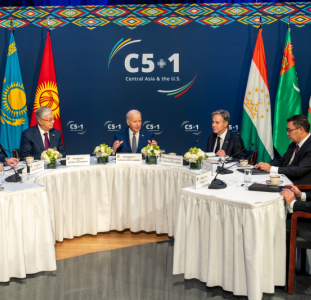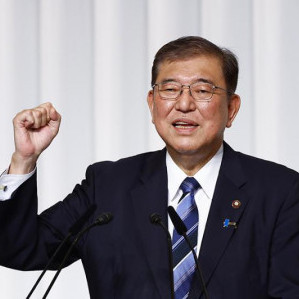Between July 12 and 14, ex-Secretary of State and now US President's special Envoy for Climate John Kerry was paying a working visit to Moscow. This has become the first visit to Russia by an such a high-ranking official under the current White House administration. To a certain exten, Kerry's visit may indicate that Moscow and Washington have proceeded to implement cooperation agreements in a number of areas, reached by Presidents Vladimir Putin and Joe Biden on June 16 in Geneva.
Judging by his Moscow meetings, Kerry's discussions were not limited to climate issues alone, as confirmed by the schedule of his stay in the Russian capital. Thus, the honored American guest had a telephone conversation with Russian President Vladimir Putin, held talks with Foreign Minister Sergei Lavrov, Special Presidential Representative on Climate Issues Ruslan Edelgeriyev, and Special Presidential Representative for Relations with International Organizations Anatoly Chubais.
By and large, the choice of John Kerry to become the first top-ranking visitor from the United States to Russia can be referred to as quite a natural thing. And there are a number of explanations for this. First, it was the issue of climate change that marked the beginning of dialogue between Biden and Putin, which culminated in their Geneva meeting, with this topic having been also touched upon. Biden himself has repeatedly stated that combating climate change is one of Washington's few avenues for cooperation with Moscow. In April this year, let's recall, President Putin took part in the climate summit arranged by the United States, by invitation of the American leader.
Secondly, John Kerry is a well-known negotiator in Russia. Back under Barack Obama, he headed the US State Department during a four-year term (2013-2017). His name is also associated with the policy of resetting US-Russian relations, which fell within Obama's first term, when Kerry headed the Senate Foreign Relations Committee and endorsed the idea of establishing an understanding with Moscow. Although today there is no talk about any reset of bilateral relations, Kerry remains a relatively "convenient" negotiator to the Kremlin, the one not directly associated with the United States' recent tough anti-Russian sanctions course.
Sergey Lavrov's meeting with John Kerry of July 12 affirmed that the visit by US President's Special Envoy for Climate elicited proper response with Moscow. Given their known history of acquaintance, Lavrov and Kerry did not need to show excessive political correctness, and they immediately got down to business, having discussed a variety of matters of mutual interest. The Russian Foreign Minister called the visit of the former US Secretary of State to Moscow an essential and positive signal for breaking international tension and further developing relations between Russia and the United States. He noted that such an approach complies with the spirit of the Putin-Biden Geneva summit. "We stand ready to promote it in every way based on an equal and mutually beneficial dialogue aimed at achieving a balance of interests," Lavrov said.
In his turn, Kerry noted that our countries' stances do not coincide on a number of issues, but the White House subscribes to an opinion that the summit in Geneva was really productive and worthwhile. According to him, interaction would yield some new opportunities and raise some new issues as long as the sides cooperate.
On Tuesday, July 13, John Kerry held a three-hour conversation with Ruslan Edelgeriyev. Through the negotiations, the parties agreed to put aside political discord and jointly counter climate change, as well as to continue the discussion in a working format, particularly at the London ministerial meeting on climate, scheduled for July 25 and 26.
Finally, on July 14, President Putin held a telephone conversation with Kerry, in the course of which, as reported on the Kremlin's website, they agreed that "climate change is one of the areas where Russia and the United States have common interests and similar approaches." John Kerry told the Russian leader about his Moscow meetings with the Russian colleagues, with various aspects of the international climate agenda discussed.
In turn, Vladimir Putin pointed out that the Russian Federation set a high value on attaining Paris Agreement objectives and advocated a depoliticized and professional dialogue in this sphere. Putin and Kerry discussed preparations for the 26th session of the Conference of the Parties (COP26) of the UN Framework Convention on Climate Change (UNFCCC) expected on October 31 to November 12 in Glasgow, Scotland, as well as prospects for bilateral environment-oriented cooperation in the Arctic, in the light of Russia's current chairmanship in the Arctic Council.
Certainly, not all the issues President Biden's Special Envoy for Climate discussed with his counterparts in Moscow have become public. Given Kerry's being an undoubted heavyweight of American politics, it would be shortsighted to limit communication with him to the climate agenda alone. In this regard, a number of experts suggest he will become a kind of "liaison" between the Kremlin and the White House when discussing delicate issues amid the two countries' present-day troubled relations. Moreover, the matter at hand is not so much about President Biden, but about the US Congress, whose performance is familiar to him, while he also has something to tell American lawmakers about Russia.
Moscow, if we turn to a recent interview by the International Life magazine with Russian Deputy Foreign Minister Sergei Ryabkov, is ready to build a stable relationship with the United States and to strike reasonable agreements. According to him, it will take time to find out whether there has been a shift for the better in relations with the United States after the ascendance of Joe Biden's administration. "This is why our senior officials and our president say that we need some time before we can say whether there have been positive developments in bilateral relations," Ryabkov said.









